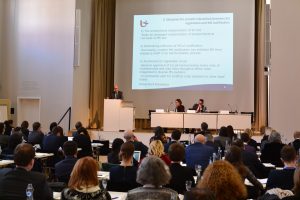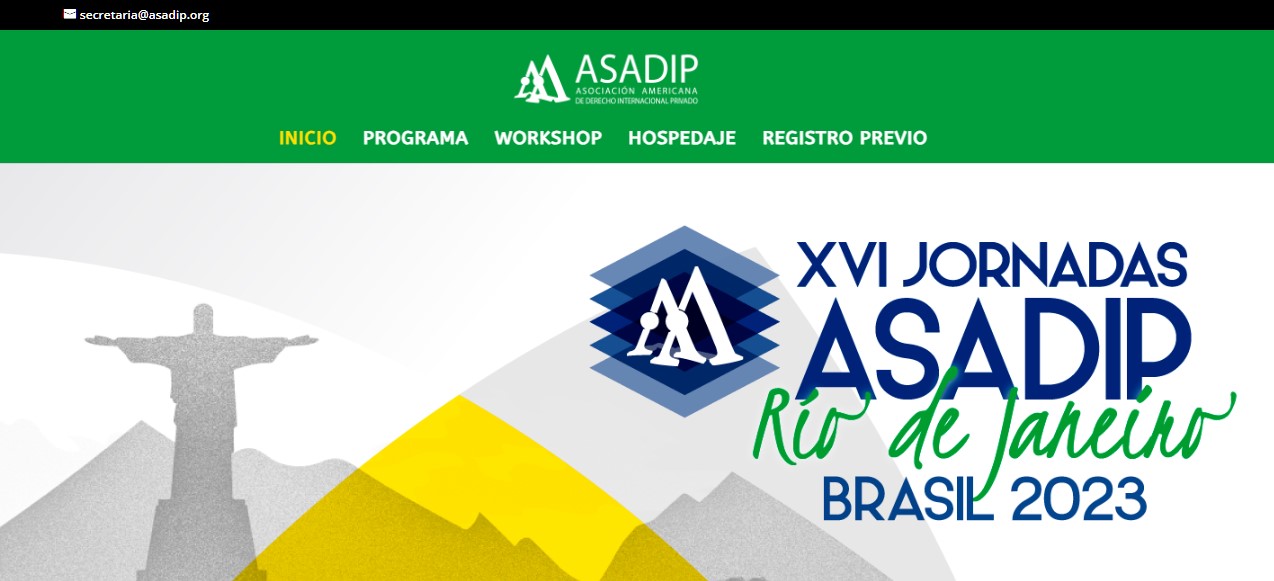Views
How European is European Private International Law? – Impressions from Berlin
Written by Tobias Lutzi, DPhil Candidate and Stipendiary Lecturer at the University of Oxford
 Last weekend, more than a hundred scholars of private international law followed the invitation of Jürgen Basedow, Jan von Hein, Eva-Maria Kieninger, and Giesela Rühl to discuss the ‘Europeanness’ of European private international law. Despite the adverse weather conditions, only a small number of participants from the UK – whose presence was missed all the more dearly – were unable to make it to Berlin. Thus, the Goethe-Saal of the Max Planck Society’s Harnack House was packed, and so was the conference programme, which spanned over two full days. Read more
Last weekend, more than a hundred scholars of private international law followed the invitation of Jürgen Basedow, Jan von Hein, Eva-Maria Kieninger, and Giesela Rühl to discuss the ‘Europeanness’ of European private international law. Despite the adverse weather conditions, only a small number of participants from the UK – whose presence was missed all the more dearly – were unable to make it to Berlin. Thus, the Goethe-Saal of the Max Planck Society’s Harnack House was packed, and so was the conference programme, which spanned over two full days. Read more
This one is next: the Netherlands Commercial Court!
By Georgia Antonopoulou, Erlis Themeli, and Xandra Kramer, Erasmus University Rotterdam (PhD candidate, postdoc researcher and PI ERC project Building EU Civil Justice)
Following up on our previous post, asking which international commercial court would be established next, the adoption of the proposal for the Netherlands Commercial Court by the House of Representatives (Tweede Kamer) today answers the question. It will still have to pass the Senate (Eerste Kamer), but this should only be a matter of time. The Netherlands Commercial Court (NCC) is expected to open its doors on 1 July 2018 or shortly after. Read more
A European Law Reading of Achmea
Written by Prof. Burkhard Hess, Max Planck Institute Luxembourg.
An interesting perspective concerning the Achmea judgment of the ECJ[1] relates to the way how the Court addresses investment arbitration from the perspective of European Union law. This paper takes up the judgment from this perspective. There is no doubt that Achmea will disappoint many in the arbitration world who might read it paragraph by paragraph while looking for a comprehensive line of arguments. Obviously, some paragraphs of the judgment are short (maybe because they were shortened during the deliberations) and it is much more the outcome than the line of arguments that counts. However, as many judgments of the ECJ, it is important to read the decision in context. In this respect, there are several issues to be highlighted here: Read more
News
Paul Herrup, Ron Brand and “A Further Look at a Hague Convention on Concurrent Proceedings”
Now published on SSRN, Paul Herrup and Ron Brand from the University of Pittsburgh School of Law have taken “A Further Look at a Hague Convention on Concurrent Proceedings.”
The current project of the Hague Conference on Private International Law has reached a critical juncture that requires careful consideration of the terms that delineate the scope of the proposed convention. Work to date has not followed the mandate of the Council on General Affairs and Policy to produce a convention that would deal with concurrent proceedings, understood as including pure parallel proceedings and related actions. In two previous articles they have addressed the practical needs that should be addressed by the concurrent proceedings project and the general architecture of such a convention. The process is now mired in terminological confusion that has hampered progress on a practical result. Differing interpretations of the directions given to those doing the work has led to situations in which the participants have been speaking past each other. In this article, they provide a reminder of the common law/civil law divergence of approaches to concurrent litigation; review the approach taken in the EU’s Brussels I (Recast) Regulation and the problems it has created; and offer suggestions regarding the proper scope and architecture of a global convention addressing the problem of concurrent proceedings.
DIGI-GUARD – Event on EU civil procedure: Service, Evidence and Brussels I bis Regulations (in Dutch, 3 NOvA education points): 30 November 2023


An event will take place on Thursday 30 November 2023 at Maastricht University in the Netherlands concerning the Service, Evidence and Brussels I bis Regulations. More information is available here.
This event is being organised within the framework of the DIGI-GUARD project, which is co-funded by the European Union under the JUST-2021-JCOO program and which stands for Digital communication and safeguarding the parties’ rights: challenges for European civil procedure.
Among the topics to be discussed will be the electronic service of documents under the Service Regulation, the upcoming digitalisation regulation, and many other practicalities relating to the service of documents within the European Union. It will also discuss the Evidence Regulation and the latest case law under the Brussels I bis Regulation. Finally, it will include breakout sessions where practical examples will be discussed and led by practitioners.



